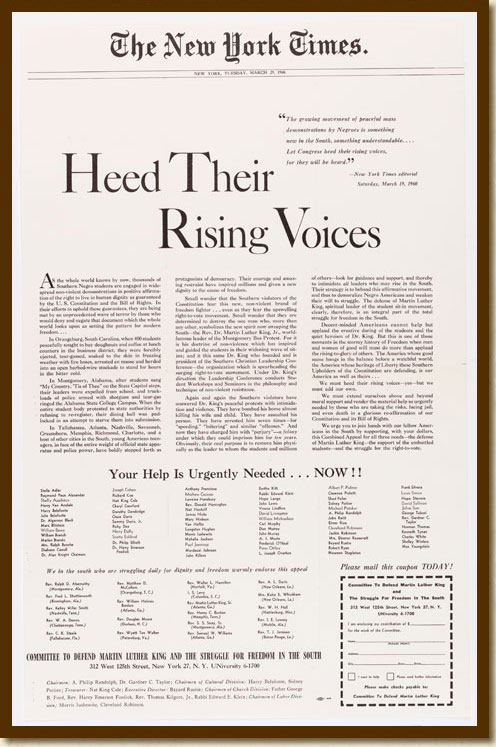The First Amendment and the Struggle for Black Equality
In 1976, President Gerald Ford officially recognized February as Black History Month. Many around the nation celebrate this annual occasion by highlighting the achievements of the civil rights movement. But there was a time in our history when segregationists used the law to oppose the movement.
Across the segregated South in the 1950s and 1960s, many Black Americans were jailed for violating laws created to deny their rights to speak, protest, and associate. For example, a group of Black Americans were arrested for praying on the steps of City Hall in Albany, Georgia. Leaders of the civil rights movement sought to overcome these constitutional violations by seeking relief from United States Federal Courts, which ultimately helped shape First Amendment precedent.
In Birmingham, Alabama, the infamous Bull Connor jailed 50 Black protestors—including Dr. Martin Luther King, Jr.—for violating an injunction that prohibited “parading, demonstrating, boycotting, trespassing and picketing” and “conduct customarily known as kneel-ins’ in churches.” Eight leaders of the Birmingham protests were ultimately convicted for violating the injunction. But their appeals were heard by the United States Supreme Court in Walker v. City of Birmingham, 388 U.S. 307 (1967) and Shuttlesworth v. Birmingham, 394 U.S. 147 (1969).
Ina five-to-four decision in Walker, the Supreme Court upheld the convictions for violating the injunction, finding that protest leaders should have applied to the Alabama courts to have the injunction modified or dissolved, rather than willfully violate it. Chief Justice Earl Warren filed a dissent, writing that “there is only one apparent reason why the city sought this injunction and why the court issued it; to make it possible to punish petitioners for contempt rather than for violating the ordinance, and thus to immunize the unconstitutional statute and its unconstitutional application from any attack. I regret that this strategy has been so successful.” Due to the ruling in Walker, the eight leaders served their sentences in Birmingham.
Two years later, inShuttlesworth, a unanimous Supreme Court overturned one of the convictions for parading without a permit, agreeing with Justice Warren that the Birmingham parade ordinance as written and applied in 1963 was unconstitutional under the First Amendment.
In 1956, the Alabama Attorney General’s office sued the NAACP in an attempt to prevent the organization from operating in the state under a state law that mandated filing certain information with the state government, which included a membership list. But the NAACP refused to produce various records, including a list of members, and the organization was held in contempt of court. The Supreme Court in 1964 reversed the conviction in a unanimous ruling in NAACP v. Alabama, 377 U.S. 288 (1964). The ruling was important because it (1) equated the right to freedom of association to other First Amendment rights, such as freedom of speech and assembly, and (2) established that an organization could defend the constitutional rights of its membership.
In 1960, four Black ministers purchased a full-page advertisement in The New York Times seeking donations for Dr. King and the civil rights movement. The ad criticized police tactics used in the South to curtail the rapidly growing civil rights movement.
 |
Advertisement, “Heed Their Rising Voices,” New York Times, March 29, 1960 |
In response to the ad, Montgomery, Alabama, police commissioner L.B. Sullivan filed a defamation lawsuit against civil rights leaders and The New York Times, which many believe was part of the Southern strategy to use libel law to limit press coverage of the civil rights movement. Alabama courts ruled in Sullivan’s favor, and state officials began to seize personal property from the civil rights leaders. Ultimately, the Alabama courts’ decisions were reversed by the Supreme Court in the landmark 1964 case New York Times Co. v. Sullivan, 376 U.S. 254 (1964) because the rule of law applied by the Alabama courts was “constitutionally deficient for failure to provide the safeguards for freedom of speech and of the press that are required by the First and Fourteenth Amendments…”. In Sullivan, the Supreme Court first noted that the “central meaning” of the First Amendment is the protection of political debate and declared the nation’s commitment to public discourse as “uninhibited, robust, and wide-open.”
There is no doubt that cases decided in the civil rights era have been widely discussed and analyzed in legal circles regarding their impact on First Amendment precedent. But as we celebrate Black History Month, we must not forget these cases would not exist without the tireless efforts of civil rights leaders and lawyers fighting laws designed to relegate Black Americans to second-class citizen status.